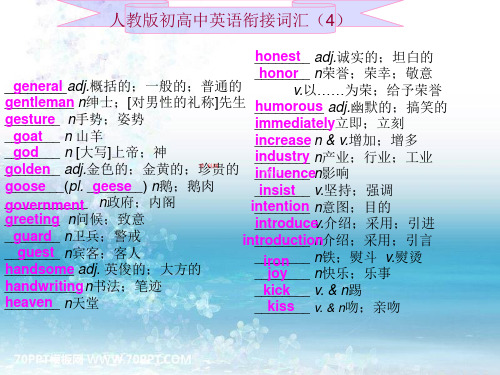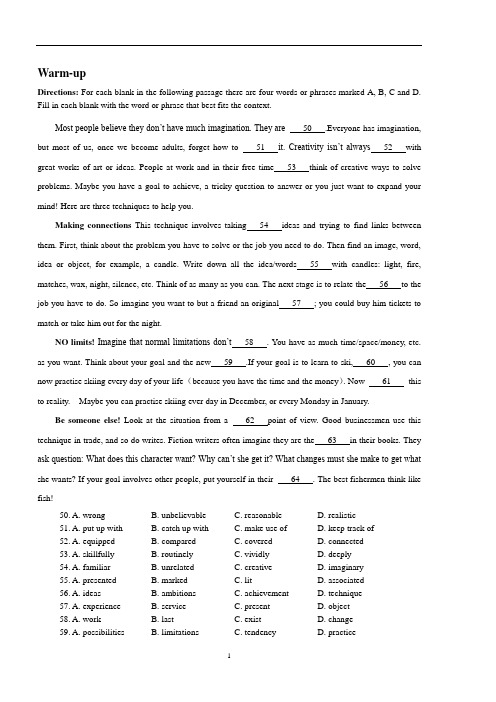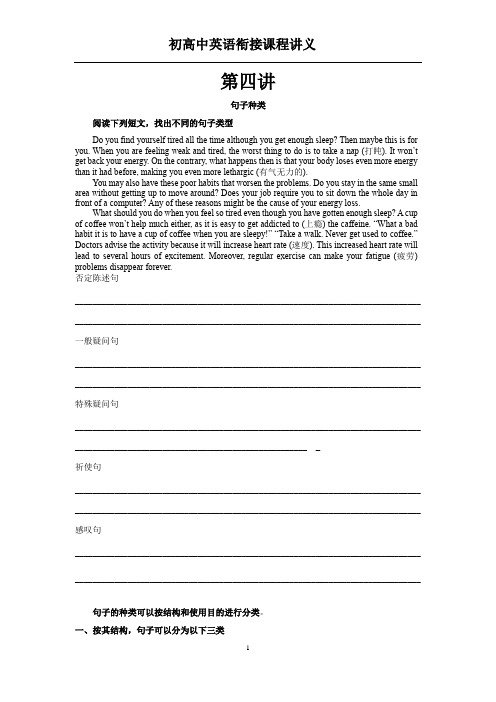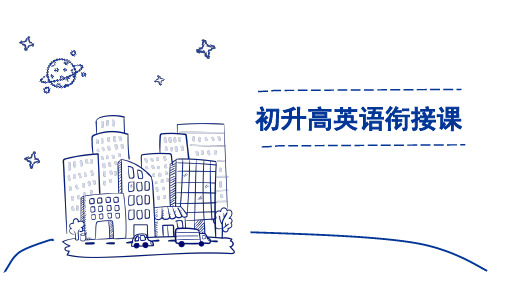初升高英语衔接班第4讲
2024-2025学年高一英语初升高衔接课之音标教学课件

cake date radio game name email
应答音
[ceik] [deit] [‘reidiəu] [ɡeɪm] [neɪm] [‘i:meil]
Diphthongs 双元音
双元音:由两个单元 音组成,发音饱满
/aɪ/
阿姨音
由/a/和/ɪ/两个单音组成, 前重后轻,口形由开到合, 与字母I的发音相同。
/ɪə/
由/ɪ/和 /ə/两个单音组 成,前重后轻,双唇始终 半开。
near dear hear year here fierce
[nɪə(r)] [dɪə] [hɪə] [jɪə(r)] [hɪə] [fɪəs] (强烈的)
Diphthongs 双元音
双元音:由两个单元 音组成,发音饱满
/eə/
/ɒ/
lock [lɒk] box [bɒks] job [dʒɒb] hot [ hɒt ] stop [ stɒp ] dog [dɒɡ]
Pure Vowels 单元音
长元音: 发音延长1-2秒
/u:/
火车音
发音技巧: 长元音,嘴形小而圆 微微外凸,舌头尽量后缩。 呜—— 火车汽笛声。
cool [kuːl] food [fu:d] room [ru:m] tooth [tuːθ] who [hu:]
blue [blu:]
Pure Vowels 单元音
短元音: 短促有力收小腹
发音技巧: 短元音 嘴唇张开略向前突出 嘴形稍收圆并放松些 发音短促有力。
/ʊ/
book [bʊk] look [lʊk] cook [kʊk] football [ˈfʊtbɔːl] good [ɡʊd] put [pʊt]
boy [bɔi] (男孩) toy [tɔi] (玩具) joy [dʒɔi] (欢乐) enjoy [in'dʒɔi] (享受) noise [nɔiz] (噪音) join [dʒɔɪn] (加入)
人教版初高中英语衔接词汇(4)讲解课件

_h_o_n_e_s_t__ adj.诚实的;坦白的
_h_o__n_o_r__ n荣誉;荣幸;敬意
__g_e_n_e_ra_l_adj.概括的;一般的;普通的
v.以……为荣;给予荣誉
_g_e_n_t_le_m__a_n_ n绅士;[对男性的礼称]先生 _h_u_m__o_r_o_u_s_ adj.幽默的;搞笑的
kiss 吻;亲吻 At the airport, she kissed them goodbye. 她在机场与他们吻别。 Grandma woke me with gentle kisses. 奶奶轻轻地把我吻醒。
guard n卫兵;警戒 The guards stopped us at the gate. 警卫在门口拦住了我们。 Be on your guard against pickpockets. 谨防小偷。 guest n宾客;客人 The hotel takes very good care of its guests. 这家旅馆对客人照顾得非常好。 handsome adj.漂亮的;英俊的;大方的 He looks really handsome in his uniform, doesn’t he?穿上制服他看上去真的很帅, 不是吗?
government n政府;内阁 The local government has promised to cut taxes. 地方政府已经承诺减税。 greeting n问候;致意 The greeting card from my former classmate came as a great surprise to me. 老同 学寄来的贺卡对我来说是个很大的惊奇。
industry n产业;行业;工业 Thailand is famous for its highly developed tourist industry. 泰国因其发达的旅游业而 闻名。
英语初高衔接课---完型4---说明类(教师版)

Warm-upDirections: For each blank in the following passage there are four words or phrases marked A, B, C and D. Fill in each blank with the word or phrase that best fits the context.Most people believe they don’t have much imagination. They are 50 .Everyone has imagination, but most of us, once we become adults, forget how to 51 it. Creativity isn’t always52 with great works of art or ideas. People at work and in their free time 53 think of creative ways to solve problems. Maybe you have a goal to achieve, a tricky question to answer or you just want to expand your mind! Here are three techniques to help you.Making connections This technique involves taking 54 ideas and trying to find links between them. First, think about the problem you have to solve or the job you need to do. Then find an image, word, idea or object, for example, a candle. Write down all the idea/words 55 with candles: light, fire, matches, wax, night, silence, etc. Think of as many as you can. The next stage is to relate the 56 to the job you have to do. So imagine you want to but a friend an original 57 ; you could buy him tickets to match or take him out for the night.NO limits!Imagine that normal limitations don’t58 . You have as much time/space/money, etc. as you want. Think about your goal and the new 59 .If your goal is to learn to ski, 60 , you can now practise skiing every day of your life (because you have the time and the money). Now 61 this to reality. Maybe you can practise skiing ever day in December, or every Monday in January.Be someone else! Look at the situation from a 62 point of view. Good businessmen use this technique in trade, and so do writes. Fiction writers often imagine they are the 63 in their books. They ask question: What does this character want? Why can’t she get it? What changes must she make to get what she wants? If your goal involves other people, put yourself in their 64 . The best fishermen think like fish!50. A. wrong B. unbelievable C. reasonable D. realistic51. A. put up with B. catch up with C. make use of D. keep track of52. A. equipped B. compared C. covered D. connected53. A. skillfully B. routinely C. vividly D. deeply54. A. familiar B. unrelated C. creative D. imaginary55. A. presented B. marked C. lit D. associated56. A. ideas B. ambitions C. achievement D. technique57. A. experience B. service C. present D. object58. A. work B. last C. exist D. change59. A. possibilities B. limitations C. tendency D. practice60. A. in fact B. in particular C. as a whole D. for example61. A. devote B. adapt C. lead D. keep62. A. private B. global C. different D. practical63. A. positions B. dreams C. images D. directions64. A. positions B. dreams C. images D. directions答案50.A 51.C 52.D 53.B 54.B 55.D 56.A 57.C 58.C 59.A 60.D 61.B 62.C 63.D 64.AIntroduction说明文往往围绕一个问题从不同的侧面来加以说明,通常结构严谨,句子结构复杂,因此是高考完形填空中较难理解的一种文体。
初高中英语衔接课程讲义4

第四讲句子种类阅读下列短文,找出不同的句子类型Do you find yourself tired all the time although you get enough sleep? Then maybe this is for you. When you are feeling weak and tired, the worst thing to do is to take a nap (打盹). It won’t get back your energy. On the contrary, what happens then is that your body loses even more energy than it had before, making you even more lethargic (有气无力的).You may also have these poor habits that worsen the problems. Do you stay in the same small area without getting up to move around? Does your job require you to sit down the whole day in front of a computer? Any of these reasons might be the cause of your energy loss.What should you do when you feel so tired even though you have gotten enough sleep? A cup of coffee won’t help much either, as it is easy to get addicted to (上瘾) the caffeine. “What a bad habit it is to have a cup of coffee when you are sleepy!” “Take a walk. Never get used to coffee.” Doctors advise the activity because it will increase heart rate (速度). This increased heart rate will lead to several hours of excitement. Moreover, regular exercise can make your fatigue (疲劳) problems disappear forever.否定陈述句_______________________________________________________________________________ _______________________________________________________________________________ 一般疑问句_______________________________________________________________________________ _______________________________________________________________________________ 特殊疑问句_______________________________________________________________________________ _____________________________________________________ _祈使句_______________________________________________________________________________ _______________________________________________________________________________ 感叹句_______________________________________________________________________________ _______________________________________________________________________________句子的种类可以按结构和使用目的进行分类。
高一英语初高中衔接讲议

高一英语初高中衔接讲议第一讲元音的发音(具体内容略)第二讲辅音的发音(具体内容略)(要求能根据音标正确拼读单词,能根据读音比较规则的、且没有学过的生词的读音拼写出单词。
)第三讲基本拼读规则1、元音字母的读音①元音字母在重读开音节中一般发长元音、双元音或强音,而在弱读音节中一般发短元音、单元音或弱音,例如:man [æ]/woman[ ], Japanese[æ]/Japanese[ ], evening[i:]/ eraser[i], Chinese[i:]/because[i], machine[i:]/medicine[ ],postcard[ ]/police[ ]。
元音字母在闭音节中一般发短音,例如:fan [æ], leg[e], ship[i], job[ ], sun[ ]。
元音字母在相对开音节中通常发字母名称音,例如:safe[ei], these[i:], price[ai], code[ ], excuse[ju:]。
位于词中间的双写辅音字母前的元音字母一般读短音,例如:carry[æ], tennis[e], dinner[i], coffee[ ], running[ ]。
但复合词可能例外,如:classroom[a:]。
②字母a在ss、st、sp、sk、th前时通常读[a:],例如:sunglasses, past, grasp,ask, father等。
字母a在[w]后时,读[ ],例如:wash, want, watch等。
但water例外,这里的a发长元音[ ]。
字母i在nd前时通常读[ai],例如:behind, find, kind等。
字母o在ld前时读[ ],例如:old, cold。
2、辅音字母的读音①大多数辅音字母可以用作音标符号,而下列几个字母反之:字母c。
在单词中,它一般读作[k],例如:careful,carrot;在字母e、i、y之前时读作[s],例如:century,city,bicycle;而与h组合成ch时,则大多读作[ ],例如:chess,chicken;偶尔例外,如machine[ ], stomach[k]。
初高衔接课

[ʃ]
[set] [ʃeɪm]
[z]
[ʒ]
[zest] [dɪ’sɪʒn] [tr]
[θ]
[θɪŋk] [ð]
[tri:t] [dr]
[ðæt]
[drʌg]
Consonants
[h] [r] [m] [n]
[hænd] [ri:d] [met] [ni:d]
[ŋ] [l] [j] [w]
[kɪŋ]
Mr. Smith, our new teacher, is very kind to us. We Chinese people are brave and hard-working.
A good beginning makes a good ending. 善始者善终
THANK YOU
时间状语
地点状语
his sister because today is her birthday.
原因状语
修饰形容词和副词:This is a pretty simple problem. He runs very fast.
常见的状语可分为11种:时间、地点、原因、目的、结果、条件、让 步、方式、程度、伴随、比较等。
宾语和宾补的关系相当于逻辑上的主系表的关系。
宾补和双宾的区别:用“是或不是”来判断。 He gives me a book.
Tom is tall.
主语+系动词+表语 (S+ link.V + P)
I am a teacher. They are back.
表语:说明主语的身份、性质、品质、特征和状态,因而表 语也可以叫做主语补足语,修饰主语。
修饰语
状语
主语+谓语
第4讲 英语五大基本句型 2023初升高英语衔接
基本句型(五):S十V十O+Oc (主谓宾+宾补)
此句型中谓语动词为不完全及物动词,主谓宾结构还不能表达完整的意
思,必须加一个宾语补足语来说明宾语的情况才能使句子完整。宾语补足
语可以由名词、形容词、非谓语动词、副词或介词短语等充当。
5.我们报纸的“外国文化”栏目非常受我们学生的欢迎。(2016全
The “Foreign culture” section (in our newspaper) is very popular (among us
国1s卷tud)ents).
基本句型(四):S十V十Oi+Od (主谓+间宾+直宾)
此句型中的谓语动词为授予动词,后接双宾语才能表达完整的意思,间接宾语 在前,直接宾语在后,但如果直接宾语在前,间接宾语在后,中间需要加上一 个介词to 或for。 常见授予动词有 give, send, tell, teach, pay, show, offer, buy, cook等 Mr Smith gave me some advice.= Mr Smith gave some advice to me. 主 谓 间宾 直宾 He bought his son a bicycle.= He bought a bicycle for his son. 主 谓 间宾 直宾
My mom cooked me a big meal (to celebrate my
4.希vic望tor我y). 能提供给你一些有用的建议。
I hope (that) I can offer you some helpful suggestions
初升高英语衔接课程
(8)单数形式但其意为复数的名词有:people, police等。
(9)数词+名词作定语时,这个名词一般保留单数形式,中间加连字符。例如an 8-year-old girl, a ten-mile walk。
5.Mike hurt one of his ______ in the accident yesterday.
A. toothB. feetC. handD. ear
6.There is some _______ on the plate.
A. cakesB. meatC. potatoD. pears
15.Where are the students? Are they in _______ ?
A. the Room 406B. Room 406C. the 406 RoomD. 406 Room
【练习答案】
1.D2.B3.B4.B5.B6.B7.A8.D9.C10.C11.C12.D13.B14.A15.B
--- Thanks.
A.ENTRANCEB.BUSINESS HOURS
C.THIS SIDE UPD.NO SMOKING
14.Are they going to have a picnic on _______ ?
A. Children’s Day B. Childrens’s DayC. Childrens Day D. Children Day
(2)以s,x,ch,sh,结尾的词加-es,例如:bus→buses,class→classes
初高中英语衔接课程(共37张PPT)
如何应对高中的英语学习?
从总体上要注意以下几点:
1、要点滴积累,不要急于求成。 2、要把握英语学习的规律,善于积累。
3、要树立信心,不要妄自菲薄。 4、要做到博闻强识,加强背诵。
从总体上要注意以下几点:
1、要点滴积累,不要急于求成。
记住:Rome isn’t built in a day!
(2)高中要学习3500左右的单词,对基础不同的 同 学要把单词分类,常用单词要会应用,书面表 达中要用到。使用频率低的单词知道意思就行了。 结构复杂、意思复杂、望文生歧义的单词要会运用。 如:
tg进ue打rt展na开o、lonn与,gtu…w关rin和t掉ho睦fsfb相; ./处pstuh穿t.,o上n,g通po脱u过tt掉ho、rfof用ug完h 、 巧适记当词展单拓
有志者事竟成
Skill comes from practice. Practice makes perfect.
熟能生巧
一、初高中英语学习的区别 二、如何应对高中的英语学习 三、高考题型 四、英语自学能力的培养
高中英语学习不是新起点,而是初中英 语学习的继续和深入,因此对初中英语 知识的掌握是高中英语学习的基础,但 两者又有区别。
尊 敬 老 人 是 华民族 的传统 美德。 古人云 :“老吾 老以及 人之老 。”千 百年来 ,华儿女 也 用 自 己 的 言行不 断充实 、丰富 着敬老 思想。
我 们 希 望 通 过此次 在简朴 寨内开 展慰问 孤寡老 人的活 动,一方 面关爱 老人,给他们送 去 一 份 温 暖 与关爱 ,给予孤 寡老人 以关注 ;另一 方面,增 强大学 生的社 会责任 感,丰富 业 余 生 活 ,为 大学生 提供在 学习之 余参与 社会实 践的机 会,使他 们接触 社会,了 解社
04 句子的种类、成分和基本句型-2020年初升高英语完美衔接专题讲与练
整。宾语和它的补足语构成复合宾语。例如:
We call her Xiao Li.
宾语 宾语补足语
You must keep the room clean and tidy.
宾语
宾语补足语
John asked me to help him with his Chinese.
宾语 宾语补足语
I will have my hair cut tomorrow.
He gets up early every day.(代词) 他每天都起得很早。
To learn English well is not easy.(不定式短语)学好英语不容易。 (二)、谓语——说明主语“做什么”、“是什么”或“怎么样”,英语中谓语只能用动.词.充当。
例如:
We work hard.我们努力工作。
A.宾语 B.定语 C. 状语 D.宾补
三、简单句的基本句型:
由一个主语(或并列主语)和一个谓语(或并列谓语)所构成的句子叫简单句。
根据句子的基本结构,简单句分为 5 种基本句型:
1.S+V;(主语 + 不及物动词)
I can swim. 我会游泳。
主语 谓语(不及物动词)
Everything changes. 万物都在变。
We are reading.
(三)、宾语——宾语是动作行为的对象。由名词、代词或相当于名词或代词的词或短
语充当,和及物动词一起构成谓语,说明主语“做什么”。例如:
Tom bought a story-book.(名词)汤姆买了一本故事书。
I saw him yesterday. (代词)昨天我看到他了。 He wanted to have a cup of tea. (不定式短语)他想要一杯茶。 直接宾语和间接宾语——有些及物动词可以有两个宾语,一个指人,一个指物,指人的 叫作间接宾语,指物的叫直接宾语。合称双宾。例如: He gave me some ink . 他给了我一些墨水。
- 1、下载文档前请自行甄别文档内容的完整性,平台不提供额外的编辑、内容补充、找答案等附加服务。
- 2、"仅部分预览"的文档,不可在线预览部分如存在完整性等问题,可反馈申请退款(可完整预览的文档不适用该条件!)。
- 3、如文档侵犯您的权益,请联系客服反馈,我们会尽快为您处理(人工客服工作时间:9:00-18:30)。
【同步教育信息】一. 本周教学内容初升高英语衔接班第4讲非谓语动词之动词不定式二. 重、难点(一)非谓语动词概述动词在句中除充当谓语外,还可以起名词、形容词或副词的作用。
在句中充当主语、宾语、表语、补语、定语和状语。
这就是动词的非谓语形式。
当句中需要用某种动作作主语、宾语或作某种修饰、说明的成分时,就要用这种形式。
动词非谓语形式有三种:动词不定式to do,分词(现在分词和过去分词)和动名词,动词非谓语形式不随主语的人称和数的变化而变化,故又称为非限定性动词。
动词非谓语形式仍具有动词的一般特征,可以带有宾语、状语等构成短语。
(二)动词不定式动词不定式能起名词、形容词和副词作用,充当谓语以外的各种成分。
1. 作主语:不定式可以直接放在句首做一句话的主语,如:To learn English is not an easy thing . 学习英语不是一件容易的事。
也可以用it作形式主语,而将不定式充当的真正主语放在后面。
如:It is important to protect our environment . 保护环境是重要的。
2. 作宾语:很多动词后面都可带不定式作宾语,如want , decide , agree , would like , hope , wish等。
如:He wants to visit Nanjing . 他要参观南京。
Mary decided to go alone . 玛丽决定一个人去。
3. 作宾语补足语:这样的动词有want , would like , wish , ask , tell , expect等,但我们需要注意有的动词后带不带“to”的不定式作宾语补足语。
如“使役动词”:let , have , make+宾语+do,感官动词hear / see / feel / notice …+宾语+do,另外,感官动词还可以加doing作宾语补足语,这时我们要知道与加不带to的不定式之间的区别。
如:I expect you to write to me . 我盼望你给我来信。
I asked him to show me his new dictionary . 我要他给我看看他的新词典。
The landlord made my grandfather work in the field all day .地主以前让我祖父整天在田里干活。
I often hear her sing when I am free . 当我有空时常听她唱歌。
4. 作表语:如:My hope is to become an artist . 我的愿望是成为一名艺术家。
The young man seems to be a college graduate . 那个年轻人好像是个大学毕业生。
To see is to believe . 百闻不如一见。
(眼见为实)She was seen to enter the hall . 有人看见她到大厅里去了。
注意此句用的是see的被动语态,它的主动语态是see sb. do sth.的短语,这种在主动语态中不带to的不定式作宾补的动词,在被动中要还原to。
5. 作定语:动词不定式作定语时,不定式所表示的动作与其所修饰的中心词之间一般有三种关系:(1)动宾关系:即动词不定式所表示的动作与其所修饰的中心词之间具有逻辑上的动宾关系。
如:She has a lot of homework to do . 她有很多作业要做。
句中不定式to do与homework之间构成动宾关系。
注意:当作定语的不定式中的动词为不及物动词时,不定式后面要加适当的介词。
如:He needed a chair to sit on . 他需要一把椅子坐。
I want a pen to write with . 我要一支笔写字。
(2)主谓关系:中心词与不定式所表示的动作之间具有逻辑上的主谓关系,即中心词是不定式动作的发出者。
如:She is always the first to come to school. 她总是第一个到学校来。
句中的the first是to come to school这一动作逻辑上的主语,即这个动作的发出者。
(3)同位关系:作定语的不定式是对中心词内容的解释和说明。
如:This is the best way to solve the problem . 这是解决问题的最好办法。
句中的way的内容是to solve the problem,二者之间是同位的关系。
6. 作状语:不定式在句中一般可作三种状语:目的状语、结果状语和原因状语。
(1)作目的状语:这时不定式前面还可加上in order和so as,构成in order to do和so as to do的形式,意为“为了……;以便于……”,作目的状语的动词不定式可放在句首,也可放在句尾。
如:In order to get there on time , he started very early . 为了能按时到那儿,他很早便动身了。
She came here to visit some friends . 她来到这儿是为了拜访一些朋友。
此外,我们还需注意,不定式作目的状语构成的简单句可以与in order that …和so that…引导的目的状语从句之间进行互换。
如:He started very early so that / in order that he could get there on time .(2)作结果状语:不定式作结果状语常用于too…to和enough to…的结构中,此外,还有only to…也表示结果。
如:He is too young to go to school . 他年龄太小,不能上学。
Xiao Ming is old enough to join the army . 小明到了参军的年龄。
I went to the cinema in a hurry only to find that the film had already finished .我匆匆忙忙地赶到电影院,结果却发现电影已经结束了。
(3)作原因状语:作原因状语的不定式常出现在表示情感的形容词后面,表示产生这种情感的原因。
如:My father was surprised to hear the news .我父亲听到这个消息,感到惊奇。
I’m sorry to hear that . 听到这件事,我感到很遗憾/抱歉。
I’m happy to see you . 见到你我很高兴。
7. 不定式的否定形式:在to前加not即可。
如:He decided not to take up the job . 他决定不干这个工作。
The teacher told him not to be late again . 老师告诉他别再迟到了。
8. “疑问词+不定式”结构:(1)常用于此结构的动词有:tell , teach , know , learn , wonder , show , ask等,这些词后面可以接宾语从句,当主句与从句的主语一致时,后面的宾语从句可简化成“疑问词+不定式”的结构。
如:I want to know how I can get there . = I want to know how to get there .我想知道怎样去那儿。
(2)当动词tell , ask , show , teach等后带双宾语且直接宾语是从句时,当宾语从句主语和间接宾语一致时,宾语从句可以转换成“疑问词+不定式”的结构。
如:Please tell me where I can find her . = Please tell me where to find her .请告诉我到哪儿能找到她。
9. 作简短回答时或避免不必要的重复时,动词不定式可省略to后的动词,但不定式的标志“to”不可以省略。
如:—Did you go to see the Great Wall ?—No , I wanted to(go to see it), but there wasn’t time .你游览长城了吗?没有,我想去(游览长城),但是没时间。
Will you help me ? —I’ll try to(help you).你愿意帮助我吗?我会尽力而为。
(但不一定能做到)10. 如果动词不定式的逻辑主语不是句子的主语或谓语动词的宾语,需要在这一逻辑主语前加for。
如:I opened the door for her to come in . 我开了门让她进来。
(不定式的逻辑主语是her)试比较:I want to open the door . 我要开门。
(动词不定式to open的逻辑主语是I)I want him to open the door . 我要他把门打开。
(to open的逻辑主语是谓语want的宾语him)【模拟试题】综合练习(一)1. After school we usually play basketball for half an hour on playground .A. the ; theB. / ; /C. / ; theD. the ; /2. There are few in the fridge . Let’s go and buy some peas , carrots and cabbages .A. vegetablesB. fruitC. meatD. eggs3. About of the workers in the clothes factory are women .A. third fifthsB. third fifthC. three fifthsD. three fifth4. The two little girls are crying . cannot find mother .A. She , herB. They , themC. They , theirD. They , her5. Jim always comes to school of all because he has to open the door for others .A. earlyB. earlierC. most earlyD. earliest6. —were you away from school last year ?—About two weeks .A. How oftenB. How soonC. How longD. When7. We have four classes the morning and then have a rest noon .A. in ; inB. in ; atC. on ; atD. at ; in8. —What are you going to do in the future ?—I’d like to be a doctor you are .A. soB. asC. whatD. when9. —Can you go swimming with us this afternoon ?—Sorry , I can’t . I take care of my little sister at home because my mother is ill .A. canB. mayC. wouldD. have to10. —I wonder where I could find something about the Museum of Natural History .—Why on the Internet ? There’s a lot of information there .A. don’t goB. not to goC. not goingD. not go11. He finished the book yesterday evening .A. seeingB. watchingC. readingD. looking12. Where Jane and Kate ? Oh , they to the reading-room .A. is ; wentB. were ; are goingC. are ; have beenD. are ; have gone13. He something important when suddenly something a very loud noise outside .A. was thought ; madeB. thought ; was makingC. was thinking ; madeD. was thinking ; was making14. A talk on Chinese history in the school hall next week .A. is givenB. has been givenC. will be givenD. will given15. Don’t your coat , Tom ! It’s easy to catch cold in spring .A. take awayB. take offC. take downD. take out16. There is a beautiful clock on the wall , ?A. isn’t thereB. is thereC. isn’t itD. doesn’t it17. There a lot of important news in today’s newspapers .A. areB. isC. wereD. is going to have18. Could you tell me ?A. where can I buy this kind of CD playerB. where could I buy this kind of CD playerC. I can buy this kind of CD player whereD. where I can buy this kind of CD player19. Could you tell me ?A. when will Tom come backB. when does Tom come backC. when Tom will come backD. when Tom comes back20. —Would you like this skirt , Madam ?—Mmm ! Very nice ! I’ll take .A. thisB. itC. themD. those21. I don’t think the number of people this happens is very large .A. whoB. to whichC. thatD. to whom22. Shanghai lies the east of China .A. toB. inC. onD. at23. —Oh , it’s late at nigh . We must go to bed now .—.A. Good morningB. GoodbyeC. Good nightD. Good evening24. —If you don’t like the red coa t , take the blue one .—OK , but do you have size in blue ? This one’s a bit tight for me .A. a bigB. a biggerC. the bigD. the bigger综合练习(二)1. She has orange skirt , skirt is nice .A. a ; theB. an ; theC. an ; aD. the ; the2. Mr. Green has lived in the hotel since he came to China .A. five-starB. five-starsC. five star’sD. five sta rs3. About people are in the People’s Park at weekends .A. two hundredsB. two hundreds ofC. two hundredD. hundred of4. —There isn’t water here . Could you get for me ?—All right .A. some ; someB. any ; anyC. some ; anyD. any ; some5. Now the air in our hometown is than it was before . Something must be done .A. much betterB. more worseC. more betterD. much worse6. Lucy and I are classmates . We in Class One .A. all areB. are allC. both areD. are both7. —Your coat looks very nice . What is it made ?—Cotton . And it is made Shanghai .A. in ; byB. from ; byC. by ; inD. of ; in8. —What do you like doing after class ?—I like not only reading painting .A. andB. but alsoC. orD. for9. “ What I do for you ? ” means “ I help you ? ”A. can , MayB. shall , NeedC. can , ShallD. will , Shall10. Sorry , I can’t hear yo u clearly . Will you please your e-mail address ? I’ll write it down .A. reviewB. reciteC. reportD. repeat11. —It’s too hot . Would you mind the door ?—. Please do it now .A. to open ; OKB. opening ; Certainly notC. opening ; Of courseD. to open ; Good idea12. —you your clothes ?—Yes .—When you it ?A. Have ; washed ; did ; washB. Did ; washed ; did ; washC. Have ; washed ; have ; washedD. Do ; wash ; did ; wash13. I a magazine(杂志)when the teacher up to me .A. was reading ; cameB. read ; was comingC. was reading ; was comingD. read ; came14. Mr. Chen has a loud voice . His voice can clearly even in that big classroom .A. hearB. be heardC. be hearingD. have heard15. After years of hard work , his dream in the end .A. came outB. came trueC. came overD. came up16. The computer is very useful in our life , it ?A. isn’tB. wasn’tC. hasn’tD. doesn’t17. Both Kate and I ready for the picnic now .A. is notB. is gettingC. are gettingD. am getting18. She said she me five letters in one month .A. has writtenB. will writeC. had writtenD. wrote19. The poor man ate a big breakfast he said he wasn’t hungry .A. sinceB. becauseC. thoughD. for20. How far is from Beijing Shanghai ?A. it ; toB. this ; tillC. that ; tillD. / ; to21. We are talking about Tonny , you met yesterday .A. whomB. whichC. thatD. with who22. —?—I have a headache , doctor .A. What’s the troubleB. What wrong with youC. What’s your nameD. What matter23. The children planted more trees and flowers after they Greener China .A. joinedB. took part inC. becameD. were24. They planted trees . Each time trees were planted .A. twice a year ; thousands ofB. two times a year ; two thousandC. twice every year ; two thousands ofD. two times each year ; two thousand综合练习(三)1. Look , you missed “ l ” in word “ could ” .A. a ; theB. a ; aC. an ; theD. an ; a2. She has been in Tianjin for ten years . Tianjin has become her second .A. familyB. houseC. homeD. room3. —Which is the smallest number of the four ?—.A. Two-thirdsB. A halfC. A quarterD. Three-fourths4. of them has a dictionary and one of them can look up words in the dictionary .A. Each ; everyB. Every ; eachC. Each ; eachD. Every ; every5. —Is the physics problem ?—Yes . I can work it out .A. easy ; easilyB. easy ; easyC. easily ; easyD. easily ; easily6. We have never seen film before . It’s very interesti ng .A. so a goodB. a so goodC. such a goodD. a such good7. —What did Mary have breakfast this morning ?—She was late for school and hurried off breakfast .A. for ; withoutB. at ; withoutC. for ; afterD. at ; after8. Get up early tomorrow , you can’t get there before seven .A. soB. butC. andD. or9. —Must I hand in the exercise-book now ?—No , you . You hand it in tomorrow .A. mustn’t ; needB. mustn’t ; mayC. can’t ; mayD. needn’t ; may10. Excuse me . Would you please tell me buy a digital camera ?A. what toB. where toC. what I canD. where can I11. He Mr. Hu to give him some work during the holiday .A. want ; to doB. wants ; to doC. ask ; to doD. hopes ; do12. They good friends since they know each other .A. were ; wereB. were ; hadC. had been ; didD. have been ; got to13. listen to the radio while you your homework .A. Don’t ; are doingB. Not ; doC. Aren’t ; are doingD. Not to ; do14. The APEC meeting in Shanghai last autumn . I hear it in different countries every year .A. is held ; is heldB. was held ; is heldC. was held ; has heldD. is held ; was held15. Could you tell me something more about Hong Kong ? I’m going there for a holiday soon .A. looking upB. thinking aboutC. trying outD. finding out16. Neither of them is right , ?A. is heB. isn’t heC. aren’t theyD. is it17. The mother with little son at my home that snowy night .A. were ; atB. was ; atC. were ; onD. was ; on18. The woman still doesn’t know what in her hometown while she was away .A. happensB. happenedC. will happenD. was happened19. The students will go to the Summer Palace if it tomorrow .A. don’t rainB. won’t rainC. doesn’t rainD. isn’t rain20. is difficult to work on the Great Green Wall .A. ThisB. ItC. ThatD. Its21. It Mike and Lily helped the old woman yesterday .A. were ; whoB. were ; whomC. was ; whoD. was ; whose22. Would you please show me the printing machine ?A. how can I useB. what can I useC. how to useD. what to use23. —Hello . May I speak to Mike ?—. Please call back later .A. Wait a minuteB. Hold on for a momentC. SpeakingD. Sorry , he is out24. The little boy when he said he had in bed all the morning .A. lied ; layB. lay ; liedC. lied ; lainD. lay ; had lied【试题答案】综合练习(一)1—5 CACCD 6—10 CBBDD 11—15 CDCCB 16—20 ABDCB21—24 DBCB综合练习(二)1—5 BACDD 6—10 DDBAD 11—15 BAABB 16—20 ACCCA21—24 AAAA综合练习(三)1—5 CCCAA 6—10 CADDB 11—15 BDABB 16—20 ADBCB21—24 CCDC【试题分析】综合练习(一)6. 答案:C。
